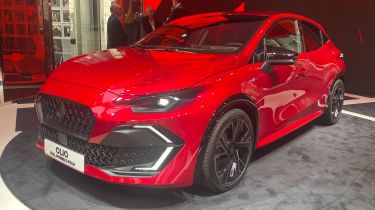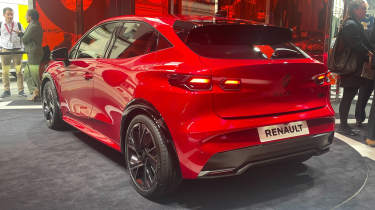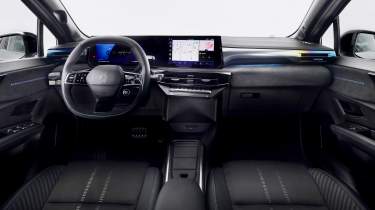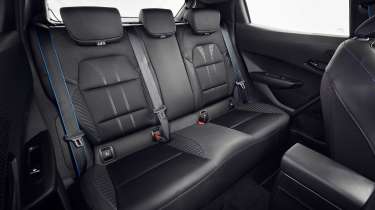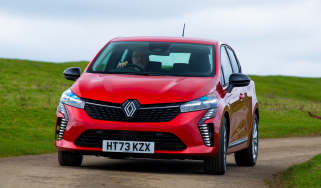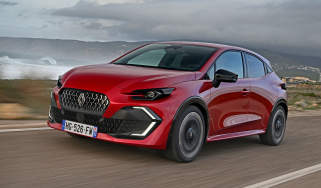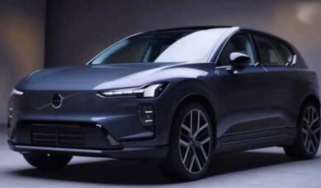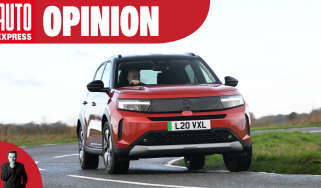Sexy new Renault Clio cranks up the old va va voom
The sixth generation of the huge selling Renault Clio has finally been revealed, and it will arrive in UK next year
The new Renault Clio has a tough act to follow, but the 2027 arrival of an angular new model looks well-placed to continue the success of the small hatch, which is still Europe’s best-selling car in 2025, despite its advancing years.
This new sixth-generation car will come with hybrid and pure petrol power as Renault maintains its two-pronged attack; the new Renault 4 and Renault 5 models address the growing EV market, while the Clio and baby SUV Captur aim for those keen to stick with petrol power.
From a design point of view, the target, according to the French brand’s design project director Paula Fabregat-Andreu, was to “elevate Clio and make it the most desirable, expressive and dynamic” car in its class.
Slightly longer, wider and taller than the outgoing fifth-generation car (an extra 67mm, 39mm and 11mm respectively, despite sitting on the same CMF-B platform), the Clio’s dimensions are intended to make it look more sporty. That slightly larger footprint doesn’t actually liberate any cabin or boot space; the extra width is taken up with additional crash protection and slight flaring of the sides. Renault has hinted, though, that the wider track will have a positive impact on the driving experience – despite being based on the same underpinnings.
The new car is deliberately more angular in styling than its curvy predecessor, a move that extends as far as the squarer font, first seen on the new Scenic, for the Clio badging in the centre of the bootlid. Although the Scenic has a slight inverse angle to its rear end, the new Clio takes that further. “It’s important to do the maximum you can for each car and create an icon,” Fabregat-Andreu continued. “Depending on the car, you can push more in some directions.”
As before, the rear door handles are hidden in the pillar, and the rear door’s glass area is reduced to create a sloping effect without actually cutting into the roofline and impacting headroom for passengers.
At the Paris preview event attended by Auto Express ahead of the Clio’s public debut at the Munich Motor Show, Fabregat-Andreu explained that the twin rear lights – unique to the small hatch sector – are supercar-inspired, and flagged the neat detail of the LED daytime running lights designed as each half of the diamond Renault logo.
If you can't wait for it to arrive in the UK, you can easily get your hands on the current generation through our Buy a Car service. We have a wide range of new Renault Clio models from just £15,000, or alternatively you can buy a used Renault Clio from just £5,000.
New Renault Clio engines and performance
The new Clio replaces the current 143bhp hybrid powertrain with the 158bhp system already deployed in the Captur small SUV. Renault claims the 89g/km emissions and 72.0mpg figures make the new car the most efficient in its class, beating the Toyota Yaris’s 92g/km and 68.9mpg, and the outgoing Clio’s 95g/km and 67.3mpg.
The efficiency jump is partially due to an increased battery size, with the new hybrid getting a 1.4kWh battery compared with the previous 1.2kWh, and in the right conditions, Renault says a driving range of 1,000km (621 miles) is possible on a single tank of fuel. Up to 80 per cent of urban running is also said to be possible on the battery alone. Performance figures put the Clio hybrid at 8.3 seconds for 0-62mph, knocking a full second off the current car’s time.
The other powertrain is a 113bhp 1.2-litre turbo petrol, which replaces the current 89bhp 1.0-litre and offers 47.0mpg and emissions from 114g/km, as well as a 0-62mph time of 10.1 seconds, more than two seconds quicker than the current 1.0-litre. In mainland Europe, an LPG powertrain with a larger tank than before – up from 32 to 50 litres – will also be offered with a combined fuel range of 1,450km (901 miles). However, there’s little interest in LPG here, so no point bringing the model to the UK.
In the current Clio range, the pure petrol model is almost £3,000 cheaper than the hybrid, and although it’s too early to talk pricing or specification, which is likely to be revealed in early 2027, only modest increases on the current sub-£19,000 starting point are expected.
What is the new Renault Clio like inside?
Tech is a big part of Renault’s attempts to pitch the new Clio as on-par with the class above, with a standard 10.1-inch infotainment screen joined by a 10.25-inch dashboard display on all bar the entry Evolution car, which gets a 7.1-inch dash. All run the Google-based system familiar to drivers of recently launched Renaults, with more than 100 apps available to download from Google Play and a free 2GB data package set to be offered on cars for the first three years, or to the end of the first owner’s tenure if that’s sooner. The trim levels are carried over from the current car, with Techno and Esprit Alpine joining the base Evolution to complete the range.
There’s a new smaller steering wheel, shared with the Austral and Rafale SUV models, and Renault says it has reduced the lock-to-lock turns from 3.3 to 2.6 to help low-speed manoeuvrability in particular.
New materials are a clear step up from the previous Clio, particularly across the upper half of the dashboard that sits in the passenger’s eyeline, and the newly designed seats include increased lateral support bolsters on the top-spec Esprit Alpine model trim.
Boot space sits at 391 litres for the petrol and 309 for the hybrid, with the reduction down to the battery packaging encroaching into the luggage area and raising the boot floor. These are the same figures as the current car, but Renault told Auto Express that it has responded to customer criticism and the boot lip is now 40mm lower to ease the loading of heavier items.
There’s a big step-up in safety tech in particular, with no fewer than 29 Advanced Driver Assistance Systems available on the new car, compared with 18 on the current Clio. Highlights among new additions such as reverse emergency braking, safe exit alert for passengers, front and rear detection with emergency trajectory correction and emergency stop assistance, where the car will bring itself to a halt if it detects that the driver isn’t responding.
Active driver assistance with intelligent adaptive cruise control is also present in what Renault claimed is almost a first for the segment, behind only its own Renault 5. A driver drowsiness and attention camera is fitted in the driver’s door pillar to meet new European rules coming into force from July 2026.
The much-lauded My Safety Switch, already seen in other Renault models, is also present on the new Clio, allowing a custom default for up to five driver assistance systems – turning on or off at the press of a button. The car also features a Safety Score system that evaluates the driver’s behaviour across speed, trajectory, safe distances and driver alertness, and a Safety Coach that offers helpful personalised tips to improve driving – which may or may not prove popular.
Evolution cars are likely to get 16-inch wheels, stepping up to 18-inchers for the two higher trims, and Renault will offer seven colour choices compared to the current car’s five, including a rather lurid green called Vert Absolu. Options will include a Harman Kardon audio upgrade, rear spoiler and side skirts.
Renault will stockpile the existing Clio over the next 18 months or so to avoid leaving itself short of a crucial big-seller as it waits for this new model, with production at the Slovenian plant partially responsible for the outgoing car due to end well before the new Clio’s potential mid-2027 arrival in the UK.
The new model will be built exclusively at the firm’s plant in Bursa, Turkey, the other current Clio production facility and neighbour to the engineering base that developed the new Clio, freeing up Slovenian production for the new all-electric Twingo and its baby EV Dacia sibling.
New Renault Clio: First reactions at preview event
Renault is keen to pitch its new supermini as on a par with the class above in terms of equipment and quality, and from our experience at the preview event we found that it at least partially delivers on this.
The top half of the cabin gets plenty of soft-touch materials, with the sculpted fabric running across the dash and onto the door panel, where it meets the crystal-effect ambient lighting, a particular highlight. But there are plenty of cheaper hard plastics on the lower half of the cabin, which isn’t unusual in the small car sector.
Rear passengers have good headroom and legroom for what is a small car, although the biggest weakness from our early experience is that it feels narrow on the inside. Three adults are a no-no in the rear, and even the front seats feel cosy when the doors are slammed shut.
The styling prompted comments from the amassed media that took in references to the Ford Focus with the increased grille area, and Mazda or even Jaguar with the pronounced bonnet creases, while the rear three-quarters and rear have hints of Stellantis’ more angular design.
But after the evolutionary nature of the fifth-generation car’s looks and the retro-inspired Renault 4 and 5 styling, the brand has clearly decided that now is the time to make a bold new statement with its biggest-selling model.
Did you know you can sell your car through Auto Express? We’ll help you get a great price and find a great deal on a new car, too.

